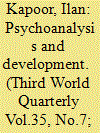|
|
|
Sort Order |
|
|
|
Items / Page
|
|
|
|
|
|
|
| Srl | Item |
| 1 |
ID:
134641


|
|
|
|
|
| Summary/Abstract |
Despite sustained critique of a neo-Malthusian focus on ‘overpopulation’, the issue continues to resurface regularly within international development discourse, particularly with respect to ‘sustainable’ development in relation to growing environmental security concerns. This suggests that the issue defies purely rational evaluation, operating on a deeper psychodynamic register. In this paper we therefore analyse the population question as a ‘scapegoat’, in the psychoanalytic sense of a fantasmatic construction concealing the gap between the symbolic order of international development and its persistent failure in practice. By conjuring the age-old image of animalistic barbarian hordes breeding inexorably and therefore overflowing their Third World confines to threaten the security – and enjoyment – of wealthier nations, the overpopulation bogeyman helps to displace attention from systemic issues within the political economy of development, namely, the futility of pursuing sustainable development within the context of a neoliberal capitalism that characteristically exacerbates both economic inequality and environmental degradation.
|
|
|
|
|
|
|
|
|
|
|
|
|
|
|
|
| 2 |
ID:
134637


|
|
|
|
|
| Summary/Abstract |
This article examines the contributions of psychoanalysis to international development, illustrating ways in which thinking and practice in this field are psychoanalytically structured. Drawing on the work of Lacan and Žižek, the article will emphasise three key points: (1) psychoanalysis can help uncover the unconscious of development – its gaps, dislocations, blind spots – thereby elucidating the latter’s contradictory and seemingly ‘irrational’ practices; (2) the important psychoanalytic notion of jouissance (enjoyment) can help explain why development discourse endures, that is, why it has such sustained appeal, and why we continue to invest in it despite its many problems; and (3) psychoanalysis can serve as an important tool for ideology critique, helping to expose the socioeconomic contradictions and antagonisms that development persistently disavows (eg inequality, domination, sweatshop labour). But while partial to Lacan and Žižek, the article will also reflect on the limits of psychoanalysis – the extent to which it is gendered and, given its Western origins, universalisable.
|
|
|
|
|
|
|
|
|
|
|
|
|
|
|
|
|
|
|
|
|